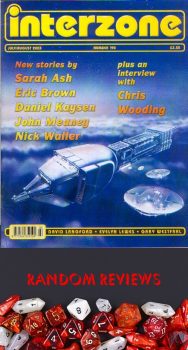Random Reviews: “Divina” by Sarah Ash

Sarah Ash’s “Divina: A Tale of Bel’Esstar” is set in her city of Bel-Esstar and focuses on the opera composer Avenel Brumiere and his muse, the Divina Oralie. Unfortunately for both of them, the story opens with Oralie’s costume igniting on the stage lights and the soprano suffering horrible burns all over her body, to which she would succumb despite the intervention of a mysterious doctor.
Part of Ash’s story deals with Brumiere’s attempts to work through his grief at the loss of his paramour and inspiration. As may be expected, Brumiere’s attempts to complete his next opera are stymied by the loss of the only woman he believes would have been able to sing the part he was writing. Dust comes to cover the score he was working on.
When the mysterious doctor appears with the offer to not only help Brumiere through his grief, but also help him regain his ability to compose, Brumiere ignores his offer. At this point, the story appears to move from a study of grief on the creative process into a deal-with-the-devil story, supported by the doctor’s business card which identifies him as Asmodé, who exhibits automata at the House of Asphodel.
Ash takes the story in a different direction, although it continues to concern itself with Brumiere’s need to rediscover his inspiration, possibly through the discovery of a new muse. Asmodé is able to help him, although not in the way Brumiere expects, and whether or not a deal has been made with the devil in the story is an exercise for the reader’s interpretation.
There is an underlying melancholy current throughout “Divina” as Brumiere attempts to find himself and even when he does begin to compose again and find a potential replacement muse, Divina Oralie is never far from his thoughts, allowing the reader to question who his muse actually is or whether the concept of the muse is a mere construct for Brumiere’s subconscious, an idea which must occur to nearly every creative type.
Brumiere is not a particularly sympathetic character, although he isn’t unsympathetic, merely moving through his life and his story. While part of this may be because of the strong sense of loss he is experiencing following Oralie’s horrific death, he would have been more sympathetic if Ash had shown his relationship with her to be more emotional and less transactional in nature. Similarly, there are moments in the story when Brumiere could have been shown as regaining a spark of emotion and joy, but he tends to be too self-focused for those moments to come to fruition.
“Divina” is just one story set in the lands of Sulien and Bel-Esstar, but it very much stands on its own, providing a reader who has not previously sampled Ash’s works an easy point of entry for her writing and her setting. Her focus in this story is primarily on Brumiere, but his interactions with the Bel-Esstar opera provide insight into the world he inhabits, without dwelling on the world too much.
 Steven H Silver is a nineteen-time Hugo Award nominee and was the publisher of the Hugo-nominated fanzine Argentus as well as the editor and publisher of ISFiC Press for 8 years. He has also edited books for DAW, NESFA Press, and ZNB. His most recent anthology is Alternate Peace and his novel After Hastings was published in 2020. Steven has chaired the first Midwest Construction, Windycon three times, and the SFWA Nebula Conference 6 times. He was programming chair for Chicon 2000 and Vice Chair of Chicon 7.
Steven H Silver is a nineteen-time Hugo Award nominee and was the publisher of the Hugo-nominated fanzine Argentus as well as the editor and publisher of ISFiC Press for 8 years. He has also edited books for DAW, NESFA Press, and ZNB. His most recent anthology is Alternate Peace and his novel After Hastings was published in 2020. Steven has chaired the first Midwest Construction, Windycon three times, and the SFWA Nebula Conference 6 times. He was programming chair for Chicon 2000 and Vice Chair of Chicon 7.